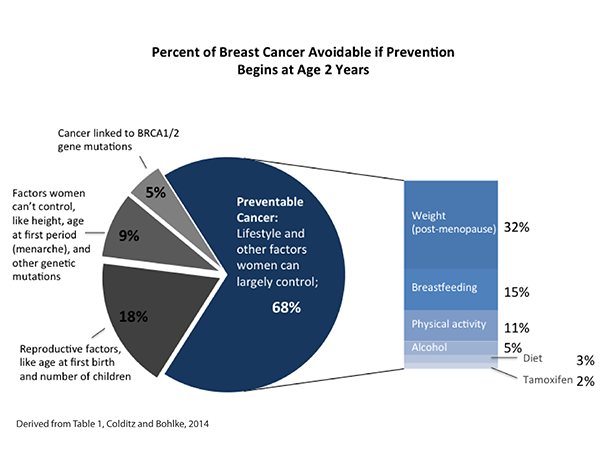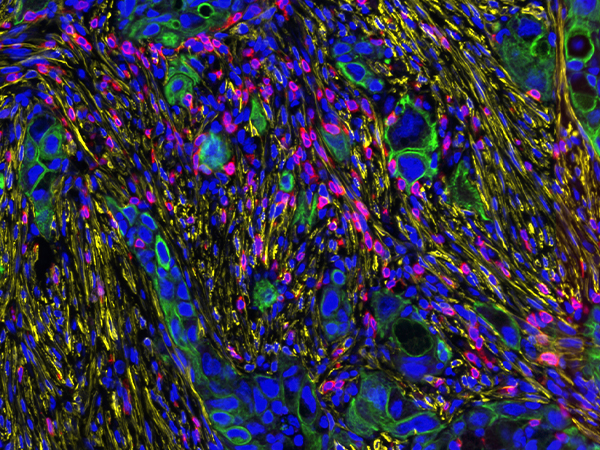A Youthful Approach: Expanding the Reach of Breast Cancer Prevention
Guest Post by Graham A. Colditz, MD, DrPH
Alvin J. Siteman Cancer Center at Barnes-Jewish Hospital and Washington University School of Medicine
Most of us are prone to some level of procrastination. From filing taxes to buying birthday gifts to paying bills, we can put some things off to the last possible moment. And apart from a bit of added stress from bumping up against a deadline, what real difference does it make? Usually very little.
The answer to that question, though, takes a serious turn when we consider something like chronic disease prevention. Study after study shows that the earlier in life healthy behaviors take hold, the greater the opportunity to lower the risk of diseases like heart disease and cancer – and to extend life.
Unfortunately, many of us don’t consider the importance of prevention until we hit mid-life, when the prospect of chronic diseases actually begins to feel more real. At this point, though, some significant opportunities have been passed by.
And the weight of new evidence shows that this may be particularly so when it comes to breast cancer.
For a disease that is responsible for one out of every four cancers in women worldwide, researchers now understand that well over half of cases could be avoided through primary prevention with roots in early childhood and adolescence.
The years between menarche (first period) and when a woman gives birth to her first child mark the most rapid aging of breast tissue as well as the fastest underlying rate of cell changes that could eventually lead to cancer. Growing evidence shows that certain risk factors have a key influence on lifelong risk accumulation in these early years: Eating too many calories, leading to weight gain and obesity; eating a diet high in animal protein and low in fruits, vegetables, and whole grains; getting little or no physical activity; and drinking alcohol. Together, these factors can have a profound effect on age at menarche and hormone exposures, as well as peak growth velocity, which has been shown to have important links with later breast cancer risk.
Because risk accumulation starts so early and continues throughout life, effective primary prevention strategies for breast cancer must begin in childhood, focusing first on healthy diet and activity. This is a key difference from most current breast cancer prevention efforts and related research, which largely target risk factors and behaviors closer to the ages breast cancer is diagnosed. A review of evidence suggests that close to 70 percent of breast cancers could be prevented by efforts started very early in life, whereas a smaller, but still quite large, 50 percent could be prevented by efforts started in mid-life (see figure).
These numbers, however, are just that: numbers. To truly realize them we need a twofold shift in our dominant perspective and approach. The first is to effectively expand the targeted ages of breast cancer research and prevention efforts to include the key years of childhood and adolescence. The second is to garner the political will to boost the funding of prevention research and implementation to levels commensurate with its potential impact. Only 7 percent of all National Institutes of Health breast cancer research projects currently focus on prevention, a small proportion given that we know that effective efforts could prevent well over 100,000 cases of the disease each year.
We can’t procrastinate on either of these. Breast cancer is a huge burden – on individual women, on families, and on the nation as a whole. We know how to prevent it. It’s time to act. Now.
Graham A. Colditz, MD, DrPH, serves as Niess-Gain Professor of Surgery, professor of medicine, and associate director of prevention and control at the Alvin J. Siteman Cancer Center at the Barnes-Jewish Hospital and Washington University School of Medicine in St. Louis. He received the 2014 AACR Award for Outstanding Achievement in Cancer Prevention Research at the 13th Annual AACR International Conference on Frontiers in Cancer Prevention Research, held Sept. 28-Oct. 1 in New Orleans. Colditz has been an active AACR member since 1996, serving on several research grant and awards committees and as a mentor in a grant-writing workshop. Read his full bio.






Great to read your posts regarding cancer prevention. We’ve joined the blogging community today scpnblog.wordpress.com. Hope you like it!